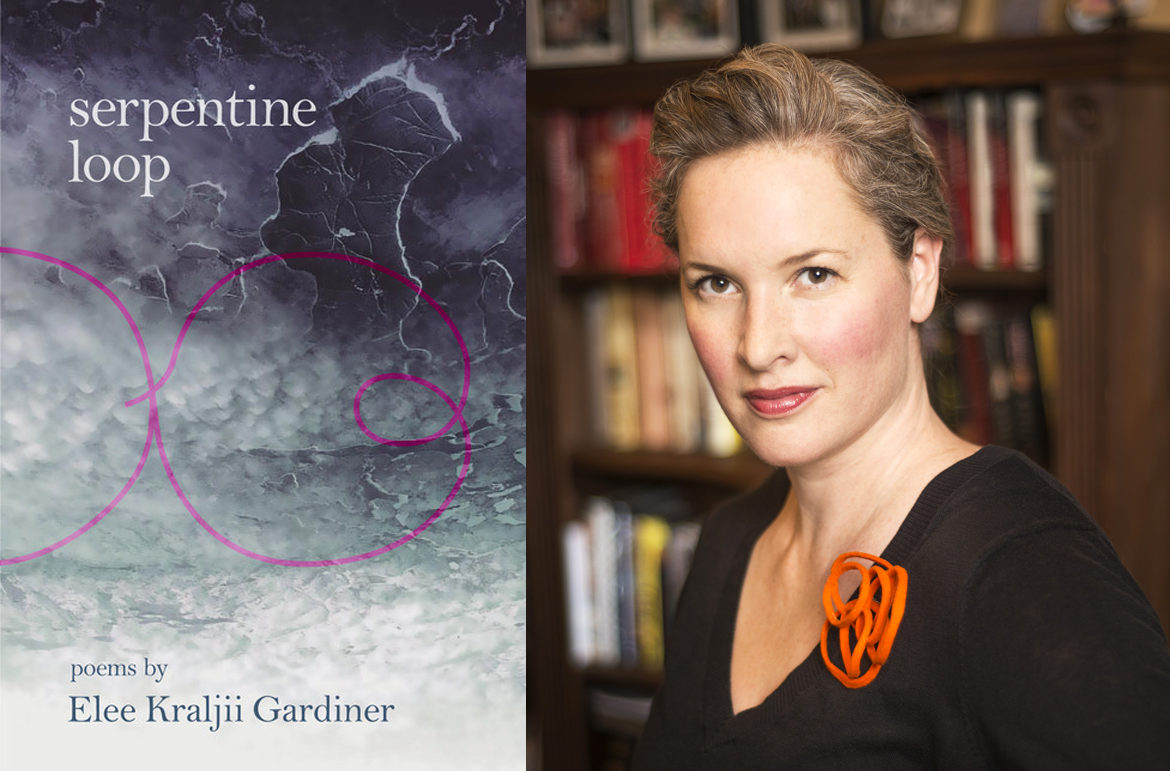Poetic Licence is a special Read Local BC column for National Poetry Month. Each column features one poet and a snapshot into their bookish world. Elee Kraljii Gardiner is the founder of Thursdays Writing Collective and her second book of poetry, Trauma Head, is forthcoming from Anvil Press this spring.
How do you write your first draft of a poem?
As a long poem, Trauma Head came about differently than individual poems – there was no wrestling or pausing or not being sure. The book tracks a year of healing from a torn artery and blood clot in my brainstem. Every day during the recovery that I was able, I jotted down a phrase or thought – things were so weird I knew I had to capture my state before I moved through it and forgot. On the day the neurologist cleared me to put my head below my heart I came to the last page of the journal. That “book” became the skeleton for the long poem. Manipulating and dressing the skeleton with image and syntactical interference in the next two drafts on the computer was a blast. And because I was relating a year-long period with definite events it was very easy to stay focused. It was horrible to live through, but a certain pleasure to recreate it on the page.
How much do you edit/rewrite a poem, and how do you decide when it’s done (or good enough)?
Trauma Head happened in three total main drafts: the first plain documentary skeleton, the second more fleshed-out poem, and the third more messed-up weird version, which was shortlisted for the Kroetsch Award for Innovative Poetry under a different title. The drafts came out easily and so simply and with such innovation in my writing that I didn’t even consider doing things another way. By comparison, I have about 50 drafts of serpentine loop, my other book of poems!
What do you eat/drink while writing and why?
Hot tea. I like to run upstairs from my basement office.
Who would you say are the greatest influences on your work?
Right now I am really aware of CA Conrad, Bhanu Kapil, angela rawlings, Rachel Rose, and Eileen Myles. Reading Myles moved me to abandon the question mark and I am loving the declarative, unapologetic interrogative. Rachel isn’t holding any punches back and is clear about what her personal line of excellence is. Angela’s response to my work (she edited both Trauma Head and serpentine loop) is an accelerant and so effective that I am still turning over her ideas from years ago. Her own work is curious, form-informed, multi-physical and so smart. Bhanu’s thinking about the body-into-text and her sensitivity to socio-political environments is riveting. I have been reading a lot of CA’s work and clinging to the intensity, direction, and seriousness of the themes but totally celebrating the connection and joy their work puts forth. I am also playing with rituals and have found some companionship in CA’s poetic rituals that are really light and playful. I am producing and editing a lot of work around death and trauma (the anthology I’m editing, Against Death, is forthcoming in 2019 from Anvil Press) and making a point of being silly, light, loving, laughing, centred as much as possible. I like how all of these authors implicate and involve themselves in the text in different ways.
Where do you like to read?
I read in the tub every day. I read in bed. I like reading alone in restaurants but that doesn’t happen often. I love narrative. Right now I am not sustained by associative or disconnected work, even if it is intellectually compelling. Anything bloodless or cold is not for me right now.
Who is a poet you think everyone should read?
Leanne Betasamosake Simpson
Show us your #Shelfie or a TBR (to be read) pile!

Elee Kraljii Gardiner founded and directed Thursdays Writing Collective, a program of free, drop-in creative writing classes in Vancouver’s Downtown Eastside, for ten years. She is the editor and publisher of eight anthologies from the Collective and the co-editor with John Asfour of V6A: Writing from Vancouver’s Downtown Eastside (Arsenal Pulp Press, 2012), a City of Vancouver Book Award finalist. Her previous book of poetry, serpentine loop (Anvil Press, 2016), was nominated for the 2017 Raymond Souster Award and named twice to The Walrus Magazine’s Best of 2016 list. Her chapbook Trauma Head (Otter Press, 2017) is a precursor to her second book of poetry by the same name (forthcoming from Anvil Press, 2018), which has already been shortlisted for the Kroetsch Award for Innovative Poetry.
Check out more 2018 National Poetry Month features here.

